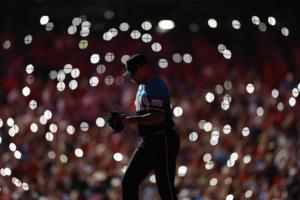Sports
/ArcaMax

Paul Sullivan: Justin Turner's walk-off home run seals Cubs' 5-3 win over Orioles
CHICAGO — Greg Maddux Tarp Sliding Bobblehead Day at Wrigley Field on Sunday began with Chicago Cubs fans chanting for a 100-year-old man as he threw out the ceremonial first pitch.
And it ended with 40-year-old Justin Turner smoking a pinch-hit, two-run, walk-off home run into the left-field bleachers in the ninth inning, sending the Cubs to...Read more

Cristopher Sánchez dazzles in Phillies' series-clinching win vs. Tigers
PHILADELPHIA — Edmundo Sosa stood on the infield, spikes planted in the dirt, unable to conceal a smile.
But the sigh of relief said it all.
Sosa had just backhanded a one-hopper and made a flat-footed throw from third base to home plate. Sounds easy, right? Well, except for the runner in the baseline who was blocking Sosa from a clear line ...Read more

Inside the Phillies' scramble to produce Jhoan Duran's walk-out show, and what could be next
PHILADELPHIA — As the umpires conferred on Friday night to determine whether Bryson Stott had beaten out the throw to first base, the control room above left field at Citizens Bank Park was holding its collective breath.
The go-ahead run hinged on the umpires’ call. If the Phillies broke the tie with the Tigers in the eighth, that meant ...Read more

After 9th-inning rally, Orioles fall to Cubs, 5-3, on walk-off homer
CHICAGO — The Orioles managed to put together another late rally, but this time the Cubs punched back.
After orchestrating a late comeback to beat the Cubs on Saturday, Baltimore showed more of the same fight by erasing 2-0 and 3-2 deficits to send Sunday afternoon’s game to the ninth inning tied. However, Justin Turner hit a two-run walk-...Read more

Pirates hang on to early lead, avoid sweep against Rockies
DENVER — Don Kelly had seen this movie before — twice in the same weekend, actually. On Friday and Saturday, the Pirates jumped out to a large lead, only to let it slip away late.
A similar script looked to be unfolding Sunday afternoon. The Pirates hit Rockies starter Bradley Blalock hard, carving out a seven-run advantage through six ...Read more

Taylor Ward's walk-off homer vs. White Sox caps Angels' comeback from 5-run deficit
ANAHEIM, Calif. — The Angels needed that one.
After losing their previous three games and facing the specter of a sweep at the hands of the team with the worst record in the American League, the Angels rallied from a five-run deficit to beat the Chicago White Sox, 8-5, on Sunday afternoon.
Taylor Ward hit a walk-off three-run homer to end it...Read more

Padres hold on in ninth inning, take series from Cardinals
SAN DIEGO — The Dylan Cease who is staying was a little better than the one who was going.
The Padres’ offense sputtered a bit but got one big hit and then a couple more.
Their augmented bullpen did its job almost as prescribed and eventually to the end.
It was far more complicated that it needed to be, but the Padres eventually beat the ...Read more
Julio Rodríguez, J.P. Crawford homer as Mariners take key series from rival Rangers
SEATTLE — For J.P. Crawford, Sunday was a perfect finish for a weekend to remember.
Just two days after sending the Mariners to a win over the Texas Rangers with a walk-off two-run homer Friday night, Crawford delivered the winning punch again Sunday with a two-run homer against Rangers ace and former New York Mets great Jacob DeGrom.
The ...Read more

Royals secure 4th consecutive series victory with late rally vs. Blue Jays
If the Kansas City Royals are going to climb the American League wild-card standings, they’ll need to find a way to defeat the top teams.
On Sunday, the Royals overcame an early deficit in a 7-4 victory over the Toronto Blue Jays at Rogers Centre in Toronto.
Royals starter Seth Lugo struggled with his command across 4 2/3 innings. He ...Read more

New-look Twins pitching staff pieces it together for one-run victory over Guardians
CLEVELAND — For the first time in nearly a week, and this has been one eternity of a week, there was finally something for Twins players to celebrate.
After trading away 10 major league players at the trade deadline, this new version of the Twins’ roster held on for a 5-4 victory over the Cleveland Guardians at Progressive Field. With the ...Read more

Luis Gil roughed up in season debut as Yankees are swept by Marlins
The Yankees got their 2024 AL Rookie of the Year back out on the mound for the first time this season on Sunday afternoon against the Miami Marlins.
However, all didn’t go according to plan.
Luis Gil was roughed up in his season debut, leading to the Yankees’ 7-3 sweep-clinching loss against the Marlins. Gil made his return from a lat ...Read more

Frankie Montas, Mets clobbered in rubber match against Giants
NEW YORK — The Mets have developed a reputation for being able to fix back-end rotation arms, turning them into frontline starters.
They might have struck out on Frankie Montas.
The right-hander had another tough start Sunday afternoon when the San Francisco Giants took seven runs off of him in only four innings, costing them in a 12-4 loss....Read more

Dodgers manufacture enough offense to slip past Rays
TAMPA, Fla. — Scoring runs at Steinbrenner Field should not be as hard as the Dodgers made it look this weekend.
The spring training ballpark, which is doubling as the Tampa Bay Rays' temporary home this season after Tropicana Field was shredded in an offseason hurricane, has small Yankee Stadium-inspired dimensions that played even shorter ...Read more

Lucas Giolito pitches season-high 8 innings as Red Sox sweep Astros
BOSTON — For the past few years, facing the Los Angeles Dodgers and Houston Astros early in the second half of the season has been the beginning of the end of the Red Sox’s playoff hopes. The Red Sox looked woefully outmatched by teams built to go the distance.
The shoe is finally on the other foot.
Over the last two weekends, the Red Sox ...Read more

Aaron Civale pitches Chicago White Sox to 1-0 win after Miguel Vargas is scratched with oblique strain
ANAHEIM, Calif. — The Chicago White Sox scratched infielder Miguel Vargas from the starting lineup moments before Saturday’s game against the Los Angeles Angels because of a left oblique strain.
The Sox said Vargas was being further evaluated.
The team produced just enough offense in his absence and received an outstanding pitching ...Read more

Cardinals' rally from 4-run deficit, then rely on new-look bullpen to save win vs. Padres
SAN DIEGO — It took a rally to erase an early deficit to give the Cardinals a chance to see how their bullpen will hold a lead without three veterans out there, including the closer they relied on a record number of times to do so.
Down by four runs by the end of the third, the Cardinals scored the game’s next eight for a 8-5 reversal on ...Read more

Luis Robert Jr. feels 'a weight off your shoulders' after staying with White Sox at trade deadline
ANAHEIM, Calif. — Chicago White Sox center fielder Luis Robert Jr. knew there was a possibility he would be traded.
“But my hope was always to stay here,” Robert said through an interpreter Friday while sitting in the visitors dugout at Angel Stadium.
Robert remained with the Sox as Thursday’s trade deadline passed.
“Definitely you ...Read more

Tom Krasovic: Early faith in A.J. Preller continues to pay off for Padres
SAN DIEGO — The summer wind was on the verge of blowing into Chicago, yet as Bruce Bochy walked in the city following yet another defeat, the young Padres manager talked as though one of Lake Michigan’s notorious winter gusts — the Hawk — might soon tear into him.
Ambling the streets that June night in 1996, Bochy quipped that if his ...Read more

Red Sox take series, move into 1st wild-card spot with 7-3 win over Astros
BOSTON — Against some teams, a four-run lead seems like enough.
The Houston Astros aren’t typically one of those teams, but thanks to a gutsy combined performance by seven Boston pitchers, the Red Sox pulled off a 7-3 come-from-behind victory to take their third straight series and overtake the Yankees in both the American League East and ...Read more

Yankees make another mental error in lifeless loss to Marlins
A day after suffering their worst loss of the season, the New York Yankees went down without much of a fight.
Eury Perez and the Miami Marlins pitchers had their way with the Yankees as they were shut out in a 2-0 loss to lose the three-game set. Perez tossed six innings, allowing just two hits while striking out five. The Bombers had no answer...Read more
Popular Stories
- Aaron Civale pitches Chicago White Sox to 1-0 win after Miguel Vargas is scratched with oblique strain
- Orioles edge Cubs, 4-3, behind Henderson's late blast, beleaguered bullpen
- New Phillie Jhoan Duran makes himself at home with No. 59, his walk-out show and spiders
- Lucas Giolito pitches season-high 8 innings as Red Sox sweep Astros
- Luis Gil roughed up in season debut as Yankees are swept by Marlins





